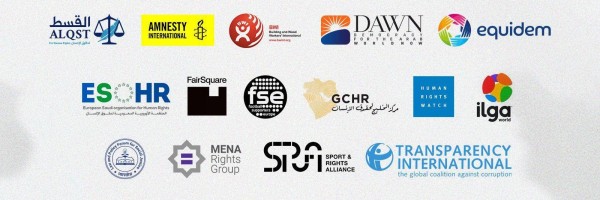ALQST has recently made three submissions to the UN Human Rights Council, ahead of Saudi Arabia’s fourth cycle of the Universal Periodic Review (UPR), documenting the deteriorating human rights situation in the kingdom since the last UPR in 2018. Its submissions include an individual report, covering broad human rights trends in Saudi Arabia, and two joint reports exploring in more depth thematic areas of concern, on digital rights (with Access Now) and the death penalty (with Reprieve, ESOHR, MENA Rights Group, The Freedom Initiative and ECPM).
All three reports highlight the fact that although Saudi Arabia formally accepted many recommendations from member states following its last UPR, adopted in March 2019, the authorities have failed to follow through with action in terms of implementation, and instead continued their ruthless crackdown on human rights and freedoms.
ALQST’s solo report shows how the rights situation in Saudi Arabia has continued to worsen since the last UPR, with further arrests and unprecedentedly long jail sentences for citizens peacefully exercising their right to freedom of expression; ongoing abuse of prisoners of conscience; and gross violations of the rights of residents, notably members of the Huwaitat tribe, in the context of massive state-backed development schemes such as the Neom megacity project. The oppressive male guardianship system remains in force, restricting the lives of Saudi women, despite the government’s formal acceptance of UPR recommendations to abolish it. Furthermore, the Saudi authorities have neither cooperated meaningfully with international human rights mechanisms nor yet ratified international treaties that they agreed, in the previous UPR cycle, to ratify.
Lina al-Hathloul, Head of Monitoring and Advocacy at ALQST, commented: “The Saudi authorities have made a lot of promises of positive, progressive reforms. Yet overall the human rights situation in the country continues to deteriorate, with no hope of justice for victims of state abuses, and no accountability for perpetrators.”
ALQST’s joint submission to the UPR with Access Now focuses on digital rights violations. It describes Saudi Arabia’s repressive legal framework and draconian laws, such as the Anti-Cybercrime and Counter-Terrorism Laws, that are used to prosecute journalists, bloggers, human rights defenders and others for content they publish online, highlighting emblematic cases such as women’s rights supporters Salma al-Shehab and Noura bint Saeed al-Qahtani, and Saudi Wikipedians Osama Khalid and Ziad al-Sufyani. The report also catalogues violations of the right to privacy, and expresses grave concerns over Saudi Arabia’s use of targeted surveillance attacks through the use of spyware such as Pegasus.
Aymen Zaghdoudi, MENA Senior Policy Counsel at Access Now, commented: “The Saudi authorities evidently lack the political will to improve their human rights record. Their consistent denial of requests for country visits by various UN special rapporteurs, coupled with their enforcement of laws that clash with international human rights standards, and their attacks on and intimidation of bloggers, journalists and human rights defenders, collectively create a climate of fear and insecurity.”
The report jointly submitted by ALQST and Reprieve, along with other partners, presents empirical data collected through their closely researched investigations on the death penalty in Saudi Arabia, as well as findings from their monitoring of executions in the kingdom and ongoing casework. It shows, for instance, that the annual rate of executions has almost doubled since King Salman came to power in 2015, despite promises of reform made in response to the last two cycles of the UPR. Draconian counter-terrorism legislation continues to be used to sentence peaceful dissidents to death, and death sentences are often handed down after the admission in evidence of confessions extracted under torture.
Duaa Dhainy, Researcher/Case Worker at the European Saudi Organization for Human Rights, commented: “Saudi Arabia has failed to implement the pledges it made during its previous UPR. Although the government has loudly boasted of making rights reforms over the past few years, its actions tell a different story. Minors remain at risk of execution, and people are yet again being executed for drug-related offences, contrary to promises announced by the authorities. That’s why meticulous human rights monitoring and the sharing of documented information remains of the utmost importance ahead of Saudi Arabia’s fourth cycle of the UPR in January 2024.”




